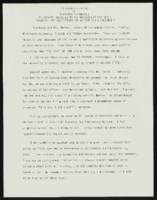Search the Special Collections and Archives Portal
Search Results

"A Dream Fulfilled" speech by Roosevelt Fitzgerald
Date
Archival Collection
Description
From the Roosevelt Fitzgerald Professional Papers (MS-01082) -- Unpublished manuscripts file. Speech for 112th Founders Day celebration of Jackson State University.
Text
Harvey's Lake Tahoe Hotel and Casino Collection
Identifier
Abstract
Collection is comprised of materials, dating roughly 1830-1995, from Harvey's Lake Tahoe Hotel and Casino Resort and the associated Harvey J. Fuller notes on casinos in Nevada. The bulk of the collection consists of paper inventories, Fuller's original notes, casino marketing materials, and casino and gambling merchandise. Also included are a number of artifacts and nineteenth and early twentieth century gambling machines.
Archival Collection
Maurine and Fred Wilson and William S. Park Audiovisual Collection
Identifier
Abstract
The Maurine and Fred Wilson and Dr. William S. Park Audiovisual Collection (approximately 1900s-1970s) consist of audiovisual material created by the Wilson and Park families. The materials depict the Park homes in Las Vegas, Nevada; Park and Wilson family members; outdoor activities and vacation trips to California, Colorado, and Mexico. The collection also documents early views of the Kiel Ranch in Las Vegas, Nevada, community parades and events, and early views of Las Vegas in the 1920s.
Archival Collection
Barbara Raben Collection on the Las Vegas Jewish Community
Identifier
Abstract
The Barbara Raben Collection on the Las Vegas Jewish Community (1976-2018) is comprised of materials collected by Barbara Raben that document her personal life and her involvement with the Las Vegas, Nevada Jewish community, specifically the Hadassah Southern Nevada Chapter and the Jewish Family Service Agency (JFSA) of Clark County, Nevada. Hadassah and JFSA records consist of photographs and programs from events held by the organizations. Materials also document Raben's business, The Candy Factory, and her connections to the Florence Melton School of Adult Jewish Learning.
Archival Collection
MGM Mirage Corporation Records
Identifier
Abstract
The MGM Mirage Corporation Records date from 1970 to 2010 and consist of the records of the Las Vegas, Nevada based global entertainment company. The collection contains organizational records, employee newsletters, files about the MGM Mirage diversity and inclusion initiative, correspondence, reports on gambling addiction, gambling statistics, press clippings, and audiovisual materials. There are also photographs, photographic slides, and photographic negatives of performers, corporate executives, and MGM Mirage properties.
Archival Collection
Junior League of Las Vegas Records
Identifier
Abstract
The Junior League of Las Vegas Records (1940-2023) contain annual reports, fundraising information, training manuals, articles, minutes, photographs, scrapbooks, cookbooks, and other operational and working files that document the activities of the Junior League of Las Vegas (JLLV). Also included is documentation for advocacy projects the JLLV was involved with, such as Drug Abuse Resistance Education (D.A.R.E.), Safe Haven, the Ronald McDonald House, Read Aloud, and Literature Awareness Program for Children. Other records in this collection document JLLV's fundraising efforts such as the Repeat Boutique, Holiday Coffees, annual benefits, luncheons, and sales of their cookbooks. Also included are scrapbooks and issues of their newsletter
Archival Collection

Transcript of interview with Willie Jones, James Jones, and Jamet Jones by Robbin Mc Laurin, March 5, 1980
Date
Archival Collection
Description
On March 5, 1980, collector Robbin McLaurin interviews three members of the Jones family, Willie, James, and Jamet Jones (born 1923, 1920, and 1961, respectively) in the Jones home. Mr. and Mrs. Jones were born in Forest, Mississippi, and relocated to Las Vegas, Nevada, for employment related purposes. This interview covers Las Vegas, past and present.
Text

Transcript of interview with Judy Laliberte by LaVaun Hendrix, February 27, 1979
Date
Archival Collection
Description
On February 27, 1979, collector Judy Laliberte interviewed local school teacher LaVaun Hendrix in her home in Las Vegas, Nevada. The two discuss how Hendrix originally came to Nevada, her occupational history, and differences between the school system in Las Vegas and other states that she’s lived in. Hendrix explains how a changing school system has affected her job as a teacher and her students. She goes on to talk about the above-ground atomic tests, Helldorado, changes to the desert, and Nevada during World War II. The interview concludes with Hendrix describing her travels through Nevada.
Text

Transcript of interview with Gertrude Rudiak by Claytee White, January 11, 2007
Date
Archival Collection
Description
Gertrude (n?e Rightman) Rudiak was born in 1915 in North Dakota to Russian immigrants. She grew up in Wisconsin until 1924. That was the year the family drove to California via the Yellowstone Trail, a dusty, undeveloped road marked by yellow stones. In Los Angeles, her father practiced chiropractic, a holistic approach to well-being for which there was little knowledge at the time. Gertrude earned her music degree at University of California at Berkeley; a decision that did not lead to a career. She then attended a business college and got a job as a social worker in Northern California. In 1941, she met and soon married George Rudiak. It was the advent of World War II. George enlisted in the service and was assigned to Las Vegas Gunnery School (Nellis Air Force Base.) Since he had a law degree from University of California at Berkeley and passed the Nevada Bar exam, he found supplemental employment with local attorneys. Las Vegas became the Rudiaks? permanent home where they raised their five children. In this interview Gertrude recalls the stories of coming to live in Las Vegas of the 1940?s: their phone number was 1-2-3; the neighborhood they lived in longest being Scotch 80s and being part of the secular and Jewish communities.
Text

